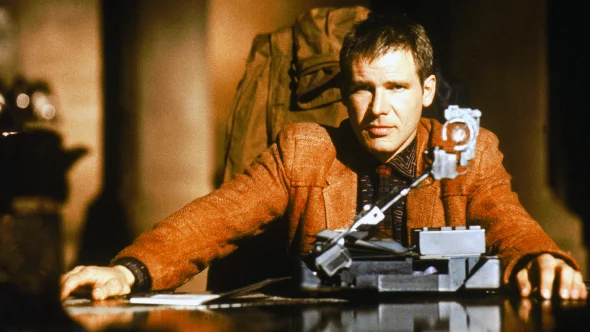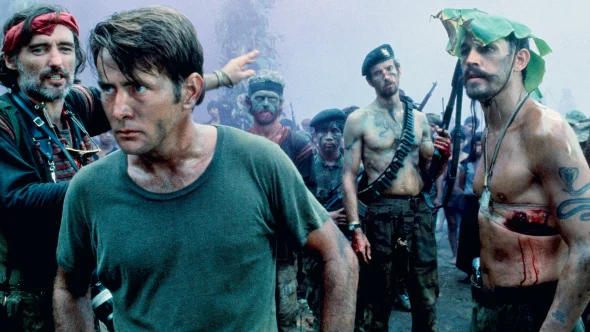
Francis Lawrence remembers seeing Star Wars for the first time, but perhaps even more so, he remembers seeing the behind-the-scenes footage that aired on TV at the time. "I was seven," he recalls, "and I remember falling in love with the making of movies. For a long time through my youth, I wanted to make movies. Then that went away and for a while, I thought I wanted to be a heart surgeon or something."
Lawrence's medical ambitions were short-lived because, as he explains, "I went to school and realized I hated math and I hated chemistry." He was more inclined to a film-centric humanities class, where he was exposed to classics like The Cabinet of Dr. Caligari, Citizen Kane, Sunset Blvd., and A Clockwork Orange.
"It blew my mind," Lawrence says. "It honestly blew my mind, and it just made me want to make movies. That's when I decided, you know what? I'm going to seek out film schools."
The director broke out helming truly iconic music videos for artists like Beyoncé, Britney Spears, Janet Jackson, Lady Gaga, and Shakira. He made his feature debut with 2005's Constantine, and then directed I Am Legend (2007) and Water for Elephants (2011) before signing on to 2013's The Hunger Games: Catching Fire. The long-standing steward of the franchise, Lawrence has since directed Catching Fire, Mockingjay - Part 1, Mockingjay - Part 2, and now, The Hunger Games: The Ballad of Songbirds & Snakes.
Below, Lawrence shares his Top 5 with A.frame. "A few of these may seem weird, because some of them are funnier movies, and most of my work, I wouldn't say people think of [as] that funny."

Directed by: Ridley Scott | Written by: Hampton Fancher and David Peoples
I was 11 when my dad took me to see Blade Runner in the theater. At first, it was a bit moody for me at that age, but it stuck. I remember going back to it as I became a teenager, and then again when I started to get into and really study film. One of the things that I really love about it is it's impeccably crafted. It's a great noir story, which is all really fun, but what it's really informed in my career is my love of world-building.
Not many people have matched what Ridley was able to do, but when you really look at world-building, lots of people have great aesthetic ideas. You come up with a point of view and specifically a point of view for the future, but you don't always understand the ideas underneath it. When you look at his world, and you think about the pollution, and you think about the mixing of ethnicities and language, there's real ideas under there, as well as the world feeling truly lived in and not just pristine and precious. That's the thing that I really took away from that.

Written and Directed by: Charlie Chaplin
City Lights is so touching, and I feel like it informed me in how important emotion is. Because I think when one looks at that movie, they might think, 'Oh, Charlie Chaplin — jokes, gags, choreography, all of that.' But what really makes it stick is how emotional the ending is and how emotionally connected you are to Chaplin's character throughout. I challenge anybody to get to the end of that movie and not cry.
It's also genius in its comedy. You look at the boxing match, and the choreography, and how genius the comedy is and all of that, but then you get to the end and it kills you. Movies need contrast. You need to laugh, you need to cry, you need to be scared, you need to be horrified. Ideally, you have as many of those emotions as possible, and that's what I learned from City Lights.

Directed by: Alfred Hitchcock | Written by: John Michael Hayes
I think it's my favorite Hitchcock film. It's almost perfect storytelling, and one of the things that I learned from it and from him is the true sense of visual storytelling. All you need to do is look at the first shot of the movie that sells the apartment complex — the people in the various windows, the fact that Jimmy Stewart has the view, the fact that he's in a wheelchair with the broken leg — and without anybody talking, you know exactly where he lives, you know that he's a photographer, that he was injured doing his job, that the camera got messed up. The visual storytelling of Hitchcock, and specifically that film, blew me away. That's something I always try to think about when crafting a movie.

Directed by: Martin Scorsese | Written by: Joseph Minion
There's so many great things about After Hours, but this one influenced me in that, when I was about 14, my parents split up. I hadn't really spent much time with my dad even when he was at home, but now it's suddenly mandatory to go hang with your dad twice a week. My dad and I would either go play golf or we'd go to the movies, and through my teenage years, I basically saw everything that was out with him. I already loved movies, which is why we went, but After Hours was the movie that made me realize that movies were not just entertainment, but they were art.
There's something about the kind of story, the kind of characters, the kind of humor, the camerawork, the world-building that he did in terms of New York and SoHo in the '80s, that really, really captivated me. It's a simple idea for a story, even though it gets very complicated, but the idea of a guy who just wants to go home, that really resonated with me. The want is very simple, but the movie is making it so impossible, and I just loved the absurdity of it.

Directed by: Francis Ford Coppola | Written by: Francis Ford Coppola and John Milius
One of the best movie experiences I ever had was going and seeing a remastered version of the original cut in 70mm at the Cinerama Dome. It's just so epic, and so authentic, and you believe that you're watching real people, in real environments, and in real war. Also, it really connected me to the power of theme in movies, and the idea of exploring the absurdity of war through a story as epic and as visual as that. I found that really, really powerful.







